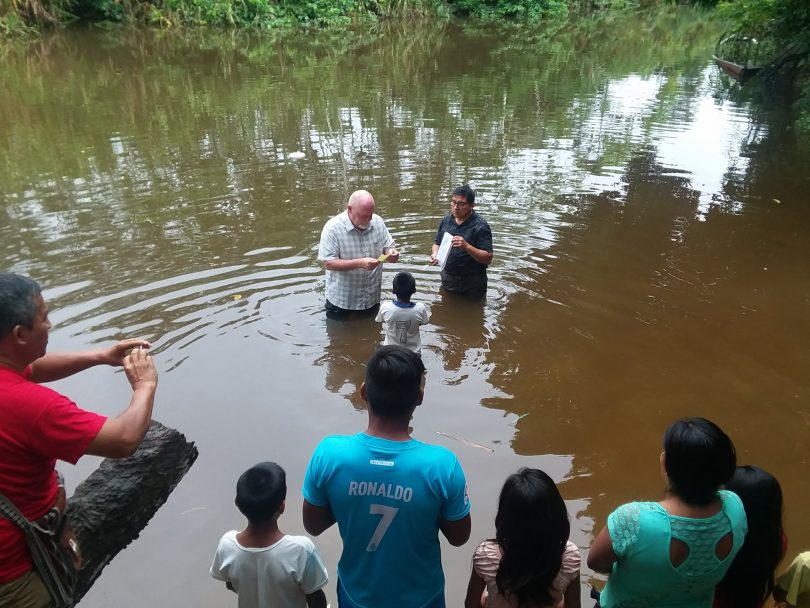Baptism Defines our Mission
The Rt. Rev. Chris Giesler
Assigned Lessons:
- Isaiah 43:1-7
- Acts 8:14-17
- Luke 3:15-17, 21-22
Can you remember your baptism? Not many can, and those who can, no doubt, were baptized as either a youth or an adult. So let me rephrase the question, can you remember that you were baptized?
It is thought that John the Baptist spent a good bit of his time living with a religious group called the Essenes out in the Judean Desert, near the Dead Sea. On a trip that I was able to take to the Holy Land, we visited Qumran, one of the Essenes’ settlements. They were known to be desert mystics, and one of their rituals was that they were baptized every day. Each community member would receive a ritual baptism by full emersion in a pool at the end of every day to wash the dirt and sin that had been part of their lives for that day. We saw the ruins of these ancient pools, and each of them had two sets of steps in them. One set in which the person entered dirty, and another set, where the person exited, clean.
John took this idea of baptism by water as part of how he was preparing people for the coming of Jesus. “I will baptize you with water,” John said, “He who is coming after me will Baptize you with the Holy Spirit.”
Jesus’ baptism serves as a model for our baptism. For Jesus, Baptism represents the beginning of his ministry, and it is a powerful story. We love to hear how the heavens opened, to imagine the dove descending, and to hear God’s blessing on Jesus, “You are my Son, the Beloved; with you I am well pleased.” We would like to think something like that happens when we are baptized. My faith tells me that God looks with great favor whenever a person receives the water of baptism.
In the Liturgy for Baptism in our Moravian Book of Worship, we read the following:
Our Lord Jesus Christ instituted baptism as the visible means of entry into the new covenant. Baptism is a gift of God. In this sacrament, through grace and the power of the Holy Spirit, we are united with Christ, are cleansed by his saving work, enter into the fellowship of the church, and are called to a life of faith and willing obedience. (Moravian Book of Worship page 165)
Baptism is the visible means of entry into the new covenant; in baptism, we are united with Christ and enter into the fellowship of the Church. It is good news that we have been included without earning it or deserving it. One of my favorite TV shows is the Andy Griffith Show. It is so partly because Andy Griffith himself was a Moravian, and he was born and raised in a town not far from where I spent a good bit of my growing years. In one episode of the show, the Women’s Historical Society had discovered that a living descendant of a Revolutionary War hero was living right there in Mayberry. The news generated excitement and curiosity throughout the town as people made plans for recognizing the hero’s relative. Andy, of course, is the Sherriff of this tranquil little town, and his deputy is Barney Fife. It is Barney who, upon hearing this news, twisted his family tree to the point that he put himself in line for the honor. The rest of the townspeople felt special just because someone among them was related to such an important historical hero.
Everyone was shocked when the news came as to who this person was. It was not Barney. After careful analysis of the genealogical records, the hero’s descendant was Otis Campbell, the town drunk. Every time Otis would drink to excess, he would stumble his way to the Sherriff’s office and lay down in one of the two jail cells to sleep it off. Mayberry’s Mayor was furious and was worried that Otis would bring dishonor to the community and ordered Andy to find a “substitute Otis” for the presentation. Andy realized how important this would be for Otis’ well-being and made sure that he showed up sober for the ceremony. When the ladies gave him the plaque they had engraved especially for him, Otis gave the plaque to the townspeople. He said, “Just because you’re the descendant of a hero doesn’t make you one. So, I would like to present this plaque to the town of Mayberry, to which I am just proud to belong.”
Well, aren’t we all? Aren’t we all just happy to belong, to be included? We can refer to this part of our baptism as incorporation. Baptism reminds us that we are included, incorporated into the body of Jesus Christ. This inclusion came about because of a love that was determined to draw us in. And long after the act of baptism, that love holds us together without ranking us as more or less important, allows us to disagree with each other without deserting one another, and leads us to use our different gifts without any need to compare them with somebody else’s gifts.
Our baptism is personal, but it is not private. We are included alongside others. The waters of baptism are symbolic of being cleansed from sin and of breaking down barriers between people. We share a common relationship with Jesus Christ in which the old divisions no longer apply. While this part of baptism can be called incorporation, it is easy to see how transformation is necessary for us to live with all who God’s love has included. Baptism is not about being incorporated into the body and then living and working with the other members of the body. As we are included alongside others, we realize that all must be transformed for the body to be healthy. As we are changed, we are more likely to expand the circle of our love to include others as full partners in the church.
In the Baptism Liturgy, just after the water has been sprinkled on the child’s forehead, we say the following prayer: “Now through God’s grace and the pouring out of the Holy Spirit, you have been brought into the covenant; therefore live, yet not you alone, but Christ lives in you; and the life which you live now, live by faith in the Son of God, who loved you and gave his life for you.”
Nothing about baptism is to remain in the sanctuary. It is meant to enable us to live in the world with Christ’s love guiding our way. Baptism gives us a mission to make our journey in life knowing that Christ goes with us. And the life that we do live is now lived by faith in the one who gave his life for us. This is a desire to live not for self but the good of others. That notion is the beginning of a blessed mission.







